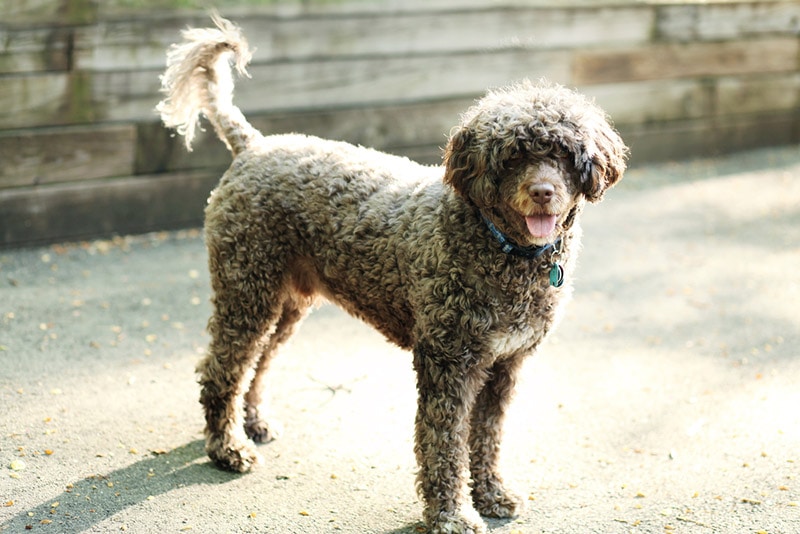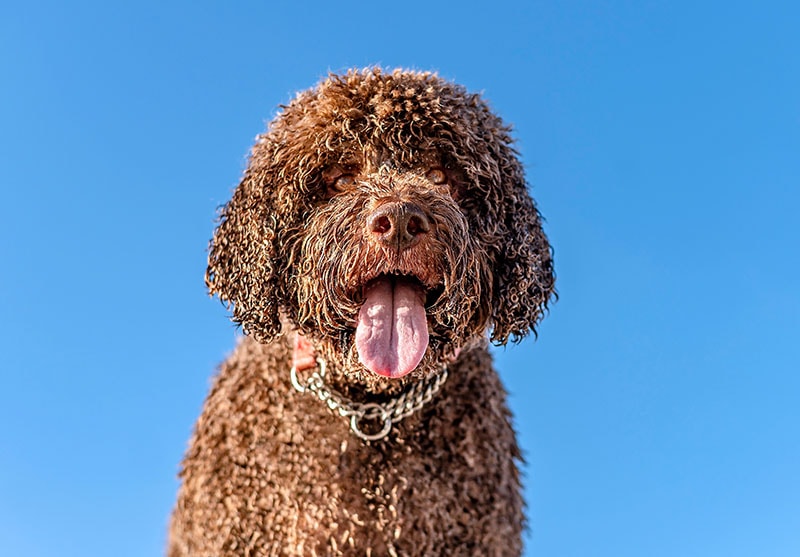Are Portuguese Water Dogs Hypoallergenic? Facts & FAQs
Updated on

In short, no, Portuguese Water Dogs are not hypoallergenic. You might see lots of claims on the internet about hypoallergenic dogs. However, the truth is that truly hypoallergenic dogs simply don’t exist.
Dog allergies in humans are caused by proteins the dog produces. These proteins are found in the dog’s skin, saliva, and urine, and all dogs produce these proteins. Dog allergies aren’t actually caused directly by the hair. Therefore, it doesn’t matter exactly what hair the dog has.
In fact, studies have found that dogs commonly labeled as “hypoallergenic” produce the same number of allergens that non-hypoallergenic dogs do.1
Do Portuguese Water Dogs Cause Allergies?
Technically, all dogs create allergies. All dogs make dander, which is what causes dog allergies. This includes Portuguese water dogs, though they are sometimes marketed as hypoallergenic. It is true, however, that Portuguese Water Dogs shed much less than other dogs. They’re similar to the Poodle in this regard. Some claim that this lower shedding rate is linked to lower allergy symptoms.
However, most studies involving hypoallergenic dogs have shown that this isn’t the case. The dander level inside homes is the same, no matter how much the dog sheds.
With that said, there is a lot of anecdotal evidence regarding Portuguese water dogs. Many owners claim that they don’t have as bad reactions to this breed as others out there. However, science has yet to back up these claims.

Do All Portuguese Water Dogs Cause Allergies?
With that said, not all Portuguese Water Dogs will cause the same allergies in people. Dogs make several different types of proteins and some of these are not made by all dogs. For instance, Can F 5 is only produced by intact male dogs. If a dog doesn’t fall into this category,2 they won’t make this protein.
Most people who are allergic to dogs are only allergic to a couple of different proteins—or even one protein. In these cases, the person may be able to avoid allergy symptoms by selecting a dog that doesn’t produce the dog allergen they’re sensitive to. This isn’t true for all dog allergies, sadly. Some proteins are made by all dogs. If someone is allergic to one of these abundant proteins, they’ll likely have a reaction to every dog.
Most allergy tests check for several dog allergies all at once. However, you can request that the doctor checks for different dog protein allergies separately, which will help you determine if you’re allergic to all dogs.
Because of the difference in allergies, it isn’t odd for people to have little to no reaction to certain dogs. This difference may be what led to the concept of “hypoallergenic” in the first place. However, what’s hypoallergenic for one person likely won’t be the same for another.

Do Portuguese Water Dogs Shed a Lot?
No, these dogs shed very little. They have a unique coat that looks like a Poodle. However, it isn’t exactly the same. A Portuguese water dog’s coat has a wiry coat that comes in two different types: curly and wavy. Their maintenance needs are pretty similar, no matter what coat type they have, though.
These dogs don’t shed very much, so they require regular grooming and haircuts. Otherwise, their fur will get extremely long and difficult to manage. Most need to be trimmed at least once a month, though it varies from dog to dog.

Managing Allergies with a Portuguese Water Dog
Luckily, even if you do have dog allergies, there are ways to manage your condition. In some cases, those with allergies are able to have pet dogs if they take the proper precautions. However, it is vital that you speak to your doctor about your particular situation. Minor allergies are easier to manage than severe ones.
Furthermore, there are many things you can do to limit a reaction to dander. There are fewer ways to manage allergies to urine or saliva, which is constantly on a dog’s coat in most cases.
Here’s a list of ways you can manage your allergies:
- Give the dog a bath regularly. When you bathe your dog, you remove the skin cells, saliva, and urine from your dog’s coat. Choose a gentle shampoo, as dogs can have reactions to harsh shampoo (which will only make them shed more dander).
- Restrict the dog’s access. Don’t allow the Portuguese Water Dog into your bedroom. You spend many hours there each night, and keeping it allergen-free can help limit your symptoms.
- Use an air filter. You can remove allergens from the air by using a high-quality air filter. These are readily available and often recommended even if you don’t have allergies.
- Take medication. There are many medications out there that can help reduce your allergy symptoms. Sometimes, a medication may be all you need to stop allergic reactions in their tracks.
- Reduce your allergen load. If you’re allergic to several different things, managing your allergies may be more complicated. If you’re exposed to one thing you are allergic to, then you may be temporarily more likely to have a reaction to other allergens, too. This is called the “allergen load.” Reduce exposure to all your allergens, and you may see your reaction to your dog decrease.
 Final Thoughts
Final Thoughts
Sadly, there is no such thing as a truly hypoallergenic dog. All dogs produce allergens to some extent. Those with dog allergies are allergic to the protein in the dander, saliva, and urine of the dog. Luckily, dogs make many different proteins, and most people aren’t allergic to all of them. Therefore, you’ll probably find that your reaction to some dogs is rather low, while others may cause serious symptoms.
Usually, these differences aren’t related to breed, though. Protein production varies greatly from dog to dog, even within the same breed. Therefore, it’s often best to “test run” any puppy before you buy them by visiting the breeder.
Featured Image Credit: Lynda McFaul, Shutterstock










